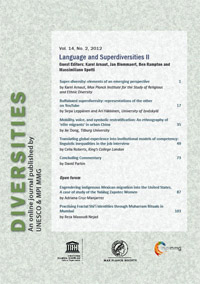OPEN FORUM
Engendering indigenous Mexican migration into the United States. A case of study of the Yalálag Zapotec Women
by Adriana Cruz-Manjarrez
Over the last three decades, a significant number of studies of Mexican migration to the United States have examined the significance of gender in structuring migration and the ways in which migration has transformed the lives of immigrant women. In this article, I expand this research by focusing on the effects of immigration on gender as it relates to the experience of indigenous Mexican women in the United States. I concentrate on these women’s experiences in relation to the situation of indigenous immigrant men and assess how immigration affects their gendered perceptions and social locations in their families, marriages, and home community in Mexico and the United States. I argue that after 50 years of Yalálag Zapotec migration to the United States, migration has been at the intersection of multiple changes in gender relations across two generations of Yalálag Zapotec immigrant women, who see and experience migration as a form of liberation. Further, I wish to demonstrate that the migration experiences of these immigrant women have impacted the lives of non-immigrant women at home.
Keywords: Indigenous Mexican migrants, transnationalism, gender, family, marriage
Suggested bibliographic reference for this article:
Cruz-Manjarrez, A. (2012). Engendering indigenous Mexican migration into the United States. A case of study of the Yalálag Zapotec Women. Diversities, 14(2), 87-101. Retrieved [todaysdate] from https://newdiversities.mmg.mpg.de/?page_id=2008
|
